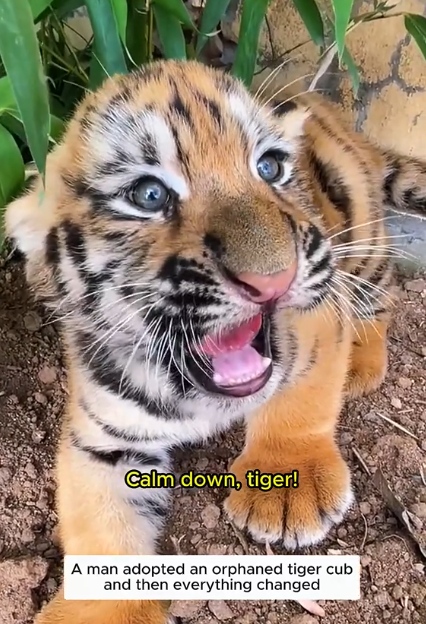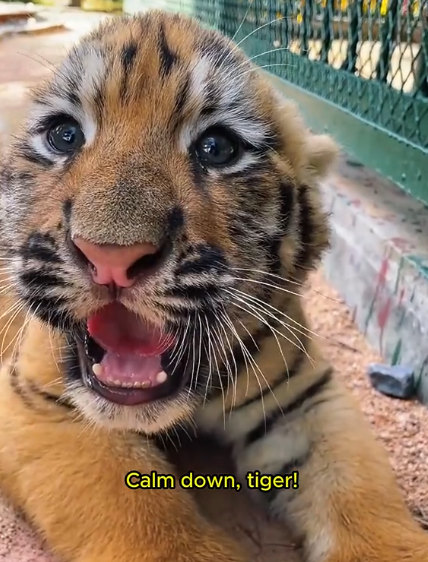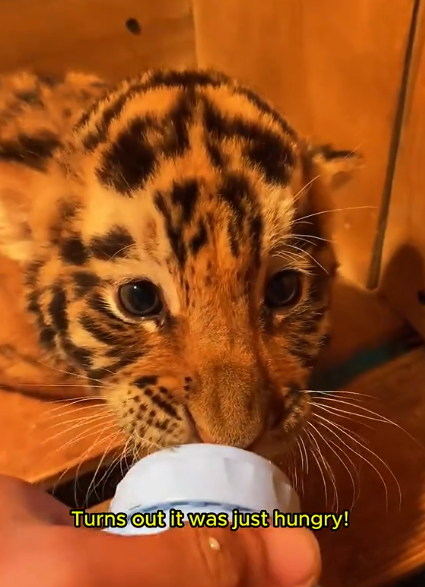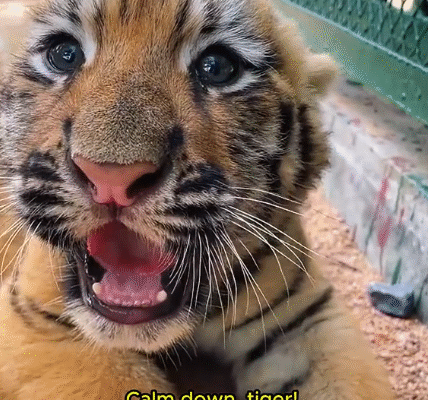
It all began on a quiet, misty morning in the dense forest edge near our village. The air was cool, and the faint call of birds echoed through the trees. I had set out early to collect some firewood, thinking it would be just another peaceful walk. But life has a way of throwing unexpected moments at you—moments that change you forever.
As I reached a small clearing, I heard an unusual sound—a soft, high-pitched whimper. It was not the cry of a bird or the rustle of a small forest animal. It was a sound of distress. My heart quickened, and I followed the noise. A few steps later, behind a thick bush, I found a small bundle of striped fur curled up on the damp ground.
It was a tiger cub.
Its eyes were half-closed, and its breathing was shallow. I looked around nervously, half-expecting a mother tiger to appear any second. But the forest was silent—eerily so. I noticed faint paw prints leading away from the cub, disappearing into the distance. It didn’t take long to realize the truth: this little one was alone. Perhaps its mother had been killed by poachers, or maybe she had been separated and couldn’t find her way back. Whatever the reason, the cub’s chances of survival without help were slim.
At that moment, a decision formed in my heart. I couldn’t just walk away. Carefully, I wrapped the cub in my jacket. Its tiny body trembled, but it didn’t resist. I could feel the rhythm of its weak heartbeat against my chest.
The walk back home felt longer than usual. Every sound in the forest made me tense, but I moved quickly. When I arrived, my family gathered around, shocked to see what I was carrying. My father frowned, worried about the risks. My mother, however, saw the desperation in the cub’s eyes and agreed we couldn’t leave it to die.
We prepared a small, warm bed for it in a wooden crate lined with blankets. I boiled some water and mixed it with milk to make a warm drink, feeding it carefully with a small bottle. At first, it refused, too weak to even lift its head, but eventually, hunger overcame fear, and it began to suckle. I watched its tiny paws knead the blanket, a sign of comfort, and my heart swelled.

In the following days, caring for the cub became my life. I named him Ravi, meaning “sun” in hope that he would bring light after this dark beginning. Ravi needed feeding every few hours, day and night. I learned quickly that raising a tiger was not the same as raising a kitten—his cries were louder, his appetite larger, and his energy unmatched when he began to recover.
By the end of the first week, Ravi was strong enough to try walking around the room. His legs were wobbly, and he stumbled often, but each time he fell, he got up again, determined. I began to realize how much strength and willpower this little creature possessed.
The bond between us deepened. Ravi followed me everywhere, his small padded paws making almost no sound on the wooden floor. When I worked in the garden, he would sit nearby, watching intently, sometimes pouncing on falling leaves as if they were prey. At night, he refused to sleep unless my hand rested close to him.
Of course, raising a wild animal came with its challenges. As Ravi grew, so did his curiosity—and his teeth and claws. He chewed on shoes, tore through my clothes, and once tried to leap into a pot of boiling soup, thinking the steam was something fun to chase. I had to be vigilant every second.
I also had to face the reality that Ravi was not a domestic pet. He was a tiger—a powerful predator in the making. My goal was never to tame him completely, but to ensure he grew healthy and strong enough to one day live where he truly belonged: the wild.
To prepare for that, I contacted a nearby wildlife rescue center. They agreed to guide me in caring for Ravi until he was old enough to be transferred to their sanctuary. They taught me how to introduce him to raw meat, how to create small hunting games so he could develop his natural instincts, and how to ensure he didn’t grow too dependent on human affection.
It was hard. Each time I saw him grow more independent—less needy for my touch—I felt both proud and sad. I remembered the fragile, trembling cub I had found in the forest, and now here he was, bounding around with the strength of a young tiger.
Months passed, and Ravi transformed before my eyes. His once-small paws became large and powerful, his soft mewl developed into a deep, confident growl. His coat gleamed in the sunlight, each stripe bold and perfect. He was no longer the helpless orphan I had found—he was a young prince of the forest.
When the day came for him to be moved to the sanctuary, I tried to stay strong. The team arrived early in the morning with a large transport crate. Ravi, curious as always, sniffed around before stepping inside, as if sensing this was the next step in his journey. I knelt by the crate, looking into his golden eyes.

“You’re going home,” I whispered, my voice trembling. “This is where you belong.”
He didn’t understand my words, of course, but he looked at me for a long moment before lying down inside. Maybe he felt my emotions, maybe he simply trusted that I wouldn’t harm him. Either way, the connection we had built was unshakable.
Watching the vehicle drive away was one of the hardest moments of my life. I felt an emptiness in the house that day, a silence where his playful roars used to be. But I knew I had done the right thing. Ravi deserved the freedom of the forest, the chance to live as nature intended.
Weeks later, the sanctuary sent me photos. Ravi was thriving—leaping through tall grass, playing with other rescued tigers, and learning the ways of the wild. My heart swelled with pride.
Adopting an orphaned tiger cub had changed me. It taught me patience, responsibility, and above all, compassion. It reminded me that even the smallest act—stopping to help a lost soul in the forest—can alter the course of a life, sometimes forever.
Ravi may no longer curl up beside me at night, but in my heart, he will always be that tiny, trembling cub I carried out of the woods. And though he now roams the wild, I believe a part of him will always remember the human who became his first family.
Because love, once given, is never truly forgotten—whether you are human or tiger.



